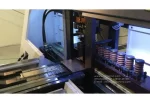Busbar bending is a crucial process in electrical and power distribution industries. It involves shaping conductive bars or strips of copper or aluminum into specific configurations to fit within a variety of enclosures, panels, or other structures. These custom bends are essential for ensuring efficient power flow and connectivity within electrical systems. The importance of precision and accuracy in busbar bending cannot be overstated, making the use of bending machines a critical aspect of modern manufacturing processes.
In recent years, advancements in technology and engineering have given rise to highly specialized bending machines designed specifically for busbar bending tasks. These machines offer a range of capabilities, punching machine allowing manufacturers to create custom bends in all shapes and sizes with unprecedented efficiency and accuracy. From simple 90-degree bends to complex multi-plane configurations, bending machines have become the go-to solution for meeting the diverse bending needs of the industry.
Precision and Versatility
One of the key advantages of modern bending machines is their ability to achieve precise and consistent bends across a wide range of busbar dimensions. Whether dealing with standard-sized busbars or non-standard, custom profiles, these machines are equipped to handle the task with exceptional accuracy. This level of precision is essential for ensuring that the bent busbars fit seamlessly into the intended applications, minimizing the need for rework or adjustments down the line.
Moreover, bending machines offer versatility in terms of the types of bends they can produce. With programmable controls and advanced tooling options, these machines can create bends in various shapes, including U-bends, Z-bends, and more. This level of flexibility allows manufacturers to meet the unique requirements of different projects without the need for multiple specialized tools or processes, ultimately streamlining production and reducing overall costs.
Efficiency and Productivity
The integration of automation and advanced control systems has revolutionized the efficiency and productivity of busbar bending processes. Modern bending machines can perform a series of bends in rapid succession, significantly reducing the time required to complete a batch of busbars. Additionally, the automation of repetitive tasks minimizes the potential for human error, resulting in consistently high-quality bends throughout the production run.
Furthermore, the speed and efficiency of bending machines contribute to overall productivity, enabling manufacturers to meet tight deadlines and handle larger volumes of work without compromising on quality. This has become especially crucial in the context of today’s fast-paced manufacturing environment, where quick turnaround times are often a prerequisite for competitive success.
Customization Capabilities
Customization lies at the heart of busbar bending, as every project may require unique bending configurations to accommodate specific design requirements. Bending machines excel in this regard, offering extensive customization capabilities to cater to a diverse array of bending needs. Whether it’s a one-off prototype or a large-scale production run, these machines can adapt to the demands of the task at hand, ensuring that each bend meets the exact specifications set forth by the design.
Furthermore, the ability to store and recall bending programs facilitates rapid changeovers between different bending jobs. This feature is particularly valuable in environments where frequent setup changes are common, allowing for seamless transitions from one project to the next without prolonged downtime. As a result, manufacturers can remain agile and responsive to evolving customer demands while maintaining a high level of operational efficiency.
Quality Control and Consistency
Consistency in bend quality is paramount in the manufacturing of busbars, as deviations in bend angles or dimensions can lead to performance issues and installation challenges. Bending machines offer precise control over the bending process, ensuring that each bend adheres to the specified parameters with minimal variation. This level of quality control translates to greater confidence in the final product, as manufacturers can rely on the consistency of bends regardless of batch size or complexity.
Moreover, the use of bending machines minimizes material waste by optimizing the bending process to maximize the yield from raw materials. By reducing scrap and rework, manufacturers can enhance their resource efficiency and minimize the environmental impact of their operations, aligning with sustainability goals in the process.
In conclusion, bending machines have emerged as the ultimate solution for customized busbar bending tasks in all shapes and sizes. Their precision, versatility, efficiency, customization capabilities, and quality control make them indispensable tools for modern manufacturing. As the demand for custom busbar configurations continues to grow, the role of bending machines in facilitating these requirements will only become more pronounced. By leveraging the capabilities of cnc punching machine bending machines, manufacturers can stay ahead of the curve, delivering high-quality, customized busbars to meet the evolving needs of the electrical and power distribution industries.

